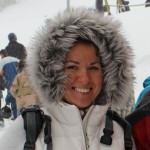topic: TRAVEL medium: TEXT
It was the first Christmas Eve I had ever been outside Iceland and away from my family. Alex and I were driving up to Vermont in the Subaru Outback she had inherited from her father. I had never been up to Springfield to see where Alex had grown up. She had not been back there herself for more than two years, her mother and sister visiting us in Boston. I know she was dreading the return. We had planned to go up for Thanksgiving but the Department of Post-Elderly Care did not close for the holiday and as the only foreigner working dispatch, I felt obligated to volunteer.
Coming up to the Massachusetts Vermont border was stunning. In Massachusetts they had clear-cut all the trees within two hundred yards of the highway. Vermont’s forest was allowed to approach a hundred and fifty yards closer. It was like the doors of the forest were slamming shut on Vermont. I could not but help but stare into the trees, looking for movement. We drove unspeaking, she focused on the road ahead, I on the scenery, still utterly foreign to an Icelander, even after living in New England for three years. We were lost inside our own minds, the only thing in common were the songs on the mixdisc playing on the car stereo. I had made it for her during the intense, scary, wonderful, first few months of our relationship. It was full of music I wanted her to like, wanted anyone I loved so much to like, and wanted her to know I liked: Neutral Milk Hotel, The Slits, Will Oldham, Sleater Kinney, Beta Band, interspersed with Motown songs about love and survival. No one ever lives up to the mixdiscs they make for those they want to be with forever.
Ten miles into the state she suddenly started telling me how she had missed out on meeting Howard Dean on three occasions growing up, how she was the only Vermonter to have not met him. I half-listened and then asked her if she had thought some more about inviting Valerie and Paul to spend Christmas with us, they had decided to stay over the holidays in New Hampshire, campaigning for Dean.
“Why don’t you invite them?”
“It’s not my family.”
“It is!”
“You know what I mean.”
“Yeah, I do. I haven’t decided anything yet.”
Marvin Gaye papered over the silence. When we passed exits she recounted memories of various town and landmarks that lay at the end of the off-ramps. Soon we reached the one for Springfield. Driving into the town I was struck by all the abandoned houses. As I looked at them I was sure I saw movement inside. They would burn easily.
“Stop staring like that,” she said,” you’re not at work.”
“I’m not thinking about work at all. I’m thinking about Christmas. My parents will call soon.”
A shambling human form passed by a window on one of the houses. Soon we were in the center of town. People were walking around, doing some last minute shopping and enjoying the festive air.
“I don’t want to invite Paul and Valerie over, but we can go tomorrow and visit them. It’s your first time in my childhood home, having them around would be too much.”
The house was at least a century old, though parts had been added throughout its life. The driveway was cut short by one of those additions, a garage, and the Subaru barely fit between the door and the street. Alex’s mother and younger sister, Emily and Moon, came to greet us. We all hugged in turn, the sisters squealing in unison as they embraced. I had never seen Emily and Moon together before. Moon went to Evergreen College out west and worked on an organic farm during summers, rarely coming back east. This was only the third time I had met her. Mother and daughter seemed like photocopies of the same original. Same wide face, large brown eyes, unruly mess of long, dark hair, both dressed in plaid shirts and jeans, moving through the world with softness, grace and fluidity, without a hint of Alex’s sharp angularity and sinewy tautness. Alex had once written a poem comparing herself to a rock skipping on the surface of a lake, each jump threatening to be the last. Her mother and sister were drops of water, dripping from the roof of a cave into an underground river, sure of destination and course.
My parents called minutes after we arrived. They were home from church and about to sit down for Christmas Eve dinner with my siblings. I talked briefly with each member of my family. After that I offered to shovel snow, widening the path to the woodshed and removing last night’s precipitation, keeping my eyes about me in case there was movement in the forest behind the garden, but it was perfectly still. I did not even see a bird. The afternoon passed quickly. Once I was back inside we all had coffee together and chatted, Moon going into the kitchen every once in a while to check on the food she had cooking. My family called again after they had opened their presents and they thanked me for the gifts I sent and told me what else they had received. When I got off the phone the table had been set and we sat down to dinner, nut roast, squash pie, succotash, asparagus and chocolate cake for desert. Conversation was mostly on the topic of Yuletides past, I explained Icelandic customs, with input from Alex who had been with me in Iceland last year. Mother and daughters told me stories of what it was was like when the sisters had been growing up. Every Christmas morning, Pete, their father, had started the day by juggling ornaments, and the sisters had not been allowed to start opening presents until they had gotten him to laugh so hard that he dropped an ornament. Jokes, funny faces, profanity, all was fair game, tickling excepted.
“I hated it so much,” said Moon.
“I really enjoyed it,” said Alex, “partly because you didn’t.”
“Once,” said Emily, “Moon got so angry she pushed her dad, who fell backwards onto the tree, pulling it down with him. Our dog, Weaver, was so startled he jumped up and ran in circles around the room, yelping and whimpering. It was just the funniest damn thing I ever saw,” she said laughing and wiped at the corner of her eye, “Moon, of course, was terrified, just stood there wailing her head off. Weaver stopped by her side and started howling.” We all laughed.
“There was talk of it being the last Christmas dad juggled,” said Alex, “but I insisted he continue the tradition.”
After washing up Moon brought out an elaborate bong she had made in high school. The exterior was covered in bark, around the top of the pipe there was a green foam ball with leaf shapes drawn in marker pen, and the stem looked like a branch.
“I can’t believe you fixed it,” said Emily.
“I can’t believe you kept it after I left,” replied Moon.
“Well, besides the bark always flaking off, it’s a perfectly serviceable bong.”
Smoking up on Christmas Eve felt excitingly blasphemous. Moon and Emily became very talkative, moving between subjects of conversation too quickly for me to follow. Alex and I fell into our customary stoned silence, speaking only when prompted. At one point Emily asked me:
“Are there zombie dogs?”
“No.”
“Zombie rats?”
“No.”
“Pigs?”
“No.”
“Chickens?”
“No.”
“Elephants?”
“Maybe. No one’s seen one for sure though.”
“Why zombie elephants but not dogs?”
“Because they don’t live long enough.”
“How long is enough?”
“Thirty six years or so. That’s how long the mutation takes to spread through the entire nervous system.” Saying that much had exhausted me. I leaned back and looked out the window.
“Dad,” said Alex, “was forty-three when he died.” Everyone fell silent. After what seemed like an eternity Moon and Emily started talking again. Outside in the driveway the Subaru looked like a robot reading a metal newspaper.
We slept until almost noon. Moon tried to juggle ornaments but broke the very first one when it hit the ceiling and cracked. Everyone thought it was funny. Alex and I laughed when we realized that we had given each other identical iPods and that we had loaded mixes onto them for each other. As I could tell from the packages, my family had all given me books, and Emily, Alex and Moon got one each. We called my family and thanked them for the gifts. Alex joked that they had sent me half the yearly literary output of Iceland. Alex called Valerie and arranged that that the two of us would go meet them in Hanover for dinner. After a big brunch we spent the afternoon enjoying our new stuff.
We left for New Hampshire at four. As we drove through the outer ring of abandoned houses a zombie stumbled onto the road a hundred yards or so ahead of us. I reached for the gasoline sprayer in the back but Alex put her hand on my arm and said:
“Please, not on Christmas.”
“Yeah,” I replied, “its fight or flight response hasn’t kicked in. It’s no danger to us.”
We waited while the corpse made its slow, shambolic way to the other side. I said:
“Why did the zombie cross the road?”
“Because its misfiring synapses told it to,” replied Alex. We laughed.
“That’s good. That wasn’t what I was gonna say, but it’s good.”
As we drove past the exhuman, who had been a stocky man in his sixties, wearing the suit of someone who had been given a funeral, so rare these days. I realized then that Alex’s father was surely around here, in one of the abandoned houses or wandering the forest. It was obvious but I had never thought of it until now. The same mixdisc was playing in the car stereo as yesterday.
Shortly after we had crossed the state border Alex turned off the CD.
“It’s over,” she said.
“I know.”
“I was going to wait until after Christmas but having you in the house is too painful.”
“I was also waiting until after Christmas.” Alex pulled over to the side of the road and then burst into tears. Comforting someone who has just dumped you does not seem right, but nonetheless, that is what I did. After she had calmed down she asked me to drive for a while. We switched seats and kept going.
“I’ll stay with Paul and Valerie,” I said.
“Yeah, that’s smart. I’ll bring your stuff tomorrow.” She started crying again.
That September day, over two years ago, when we made it back to civilization together, just the two of us, it seemed like fate had joined us never to part again. We had survived a week in the wilderness during the Apocalypse, watching our friends die, overcome by the reanimated dead. It seemed worth it somehow. Fate, we thought, had brought us to the same hiking trip, and we were fated to be together forever. But life went on and now the dead seemed more real than the love we once had.






Comments are closed